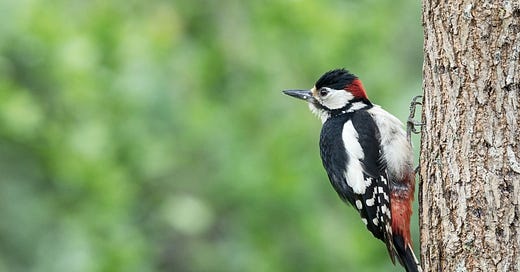Does anything carry the promise of Spring like the drumming of a great spotted woodpecker?
Beginning on warmer days in late winter, these brief resonant bursts are delivered from on high.
This is not the sound of a hole being excavated - that’s a more discreet tap-tapping, from lower down the trunk. The drumming is territorial, and it’s the volume that counts.
For this reason great spotted woodpeckers favour dead, hollow trunks and branches to sound off from. They rather like the metal casing on top of a telegraph pole too. It’s like they’ve found the amp that goes all the way up to 11.
In the UK, the great spotted is by far the commonest of our three woodpeckers, and by far the likeliest drummer we will hear.
It is a short burst, much less than a second, followed by a long pause, typically 10 seconds or more. This gives the listener a sense of anticipation - did I heard that right? Will it call again? Did it disappear? Ah, there it is.
It's like a microcosm of the experience of those occasional warm, song-filled days early in the year - the ones that seem so assured of the coming season, only to be supplanted by a convulsion of cold windy weather. The ones that leave you wondering whether you dreamed the whole thing up.
Explosive chick
Whatever the season, the presence of a great spotted woodpecker is most often given away by its loud and insistent contact call - an exclamatory ‘chick!’.
This is given both in flight and when perched. Tuning in to this sound will result in many more woodpeckers in your life.
Just remember that they have explosive chicks.
There’s a new Shriek of the Week every Friday. If you know someone who might like a dose of birdsong in their inbox, please pass this along.
Would you like to go all-in learning the sounds of birds with me this Spring? The British Birdsong 101 course begins a week today, featuring the sounds of more than 50 species, with downloadable audio lessons, live group practice sessions and ID support throughout.
See the Birdsong Academy site for more details and how to register.
Thanks to Hans Veth for the images, via Unsplash.




Thank you really enjoying shriek of the week